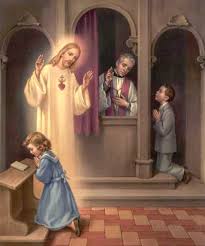Rite of the sacrament of penance

The priest blesses the Christian who enters the confessional with the prayer of the Church : “The Lord be in your heart and in your mouth, that you may well confess your sins. In the name of the Father and the Son, and the Holy Spirit. Amen”. - After hearing the sins of the penitent, giving him instructions and imposing penance, the priest prays for God's mercy for him :
“May Almighty God have mercy on you, and having forgiven your sins, will lead you to eternal life. Amen. Forgiveness, forgiveness and forgiveness of sins may be given to you by the Almighty and merciful Lord. Amen.”
Then the confessor frees the sinner from church punishments, what he could bring on himself. He says :
“May our Lord Jesus Christ absolve you, and by His power I release you from all the bonds of excommunication and interdict according to the extent of my power and your need ".
Now the priest makes the sign of the cross of St.. and pronounces the words of absolution : “Then I forgive you your sins in the name of the Father and of the Son, and the Holy Spirit. Amen”.
Remembering the relationship, that connects us to the merits of Jesus Christ and the saints, which we can benefit from, i na to, that our lives can also be deserving because of communion with Jesus Christ, The Church asks through the mouth of the priest :
Let the passion of our Lord Jesus Christ, the merits of the Blessed Virgin Mary and all saints, and that's it, what is good you do and endure unpleasantness, will serve you to receive the remission of your sins, to multiply grace and redeem the prize of eternal life. Amen”.
After finishing this prayer, the confessor gives a sign to the penitent, that he could go away from the confessional.
Forgiveness
Through the indulgence, the Church gives us temporal punishment (temporal) for sins, who had already been forgiven in the sacrament of penance. No punishment for sins can be received, which have not yet been forgiven.
The Church has the right to forgive the penalty of sins. For Christ said : "What will you solve on earth, will be dissolved in heaven " (Mt 18, 18).
By granting an indulgence, the Church offers Christ's atonement to God, Mother of God and the saints as "the equivalent" for this temporal punishment, which he donated. The church therefore rewards the justice of God, drawing from the treasury, in which the reparations of Christ the Lord are gathered, His Holy Mother and all the saints.
A plenary indulgence is the remission of all temporal punishment. A partial indulgence is the forgiveness of part of the temporal punishment. Only God knows, how much is it.
A plenary indulgence can only be gained once a day.
An indulgence can be offered for the deceased. Please then, that God instead of us, he was forgiven for his sins.
You can gain an indulgence, when one is in a state of grace and the conditions prescribed by the Church are fulfilled (good deeds or prayer). One should also be in such an inner disposition, which excludes all attachment to sin, even light.